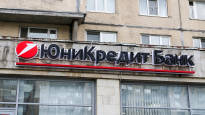Russia confiscated 700 million euros of German and Italian bank funds. The problems are hardly reflected in Europe, but the continuation is eagerly awaited.
Russia’s decision to confiscate the assets of major European banks raises an awkward question: Is there a continuation and what next?
– This kind of thing always comes as a surprise, although on the other hand it has been expected because this kind of thing has been seen in sectors other than banks, says the head of the department of the Financial Supervisory Authority responsible for banking supervision Marko Müller.
According to Myller, it is “realistic to expect” that either the same or other foreign banks operating in Russia will be subject to similar measures.
Since the beginning of the Russian war of aggression, banking supervisors in Europe have been preparing for completely new Russian risks. For example, in the banks’ risk calculations, it has been necessary to prepare for the fact that the bank can continue its operations in Europe, even if the business in Russia is completely lost.
This week, Russia seized the assets of the German Deutsche Bank and Commerzbank and the Italian UniCredit bank for a total of more than 700 million euros. According to the official explanation, the seizure is related to a contract dispute with a subsidiary of the gas giant Gazprom.
“Can arouse mistrust in the market”
Information about the seizure came only after the stock exchanges closed. The reaction of the stock market will not be seen until tomorrow, Monday.
Myller estimates that Russia’s actions will no longer shake the operations of banks in Europe.
– The direct effects in Europe are moderate, but of course it can arouse mistrust in the market.
According to Myller’s assessment, the losses of the banks in Russia will not be reflected in the European economy, at least to a large extent.
– In relation to the banks’ balance sheets, the amounts are quite moderate and the banks have already been preparing for this kind of risk for more than two years. The supervisors have also monitored the situation.
Is there a continuation of Russia’s actions?
In practice, preparedness for risks means that the bank’s balance sheet has to have capital that can be used to cover possible losses.
– In practice, the risk related to reputation is perhaps the most important.
Finnish banks have withdrawn from Russia and, according to Myller, even the indirect Russian risks have gone through since the war of aggression started.
However, one consequence of the actions is the uncertainty they create.
More than a year ago, Russia took over the assets of the energy company Fortum, including seven power plants in Russia. The authorities told Fortum that they had also changed the CEO in Fortum’s Russian subsidiary.
The Swedish furniture chain Ikea has also been prevented from getting its money out of Russia. The money comes from a deal where Ikea sold its Russian factory and Moscow headquarters.
One can only guess whether there are also political motives behind the bank confiscation. Russia does not directly benefit from making it difficult for foreign banks to operate, because, for example, the ongoing trade with Europe also requires banks to operate.
Now the market is monitoring whether new similar measures are aimed at banks or other Western companies.
